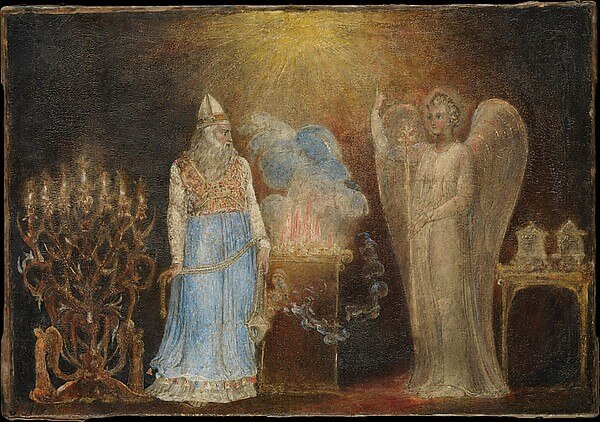A new HtV publication dares ‘to sport with common sense’!

The Angel appearing to Zechariah. William Blake.
When describing one of the foundational supernatural experiences of the Mormon religion, in which an Angel visited the prophet Joseph Smith in his bedroom and disclosed the location of the ancient scriptures that would become The Book of Mormon, an early convert named Oliver Cowdery claimed that ‘although it was in the night, yet it was not a dream.’ Furthermore, Cowdery asserted, ‘There is no room for conjecture in this matter, and to talk of deception would be to sport with the common sense of every man who knows when he is awake, when he sees and when he does not see.’ But what, in 1835 rural America, comprised ‘common sense’?
In a new essay published by The Lancet Psychiatry – Mind and spirit: hypnagogia and religious experience – HtV’s Adam Powell draws on extensive historical research to suggest that the key to understanding such nineteenth-century religious experiences may, indeed, be to ‘sport with common sense’. The understandings of consciousness at the time relied on lingering philosophical questions about the mind and its limitations posed by early modern thinkers. Yet, relatively recent studies have explored states of consciousness that challenge those earlier systems. Hypnagogia, a state of consciousness that is somewhere between wakefulness and sleep, and in which unique sensory phenomena occur, is a useful example.
Hypnagogic hallucinations seems particularly ‘real’ or ‘authentic’ and frequently include sensations such as the feeling that someone is in the room with you or that the room is filled with bright light. Historical figures who experienced extraordinary events often described them as ‘dreams’ or ‘visions’, seemingly using these terms interchangeably. Historians have taken this for granted, but what if the confused use of the terms reflects the confused effort to squeeze the experiences into inadequate categories? What if these religious figures, like Joseph Smith, were experiencing mental states between waking ‘visions’ or sleeping ‘dreams’? And, what if ‘common sense’ is a product of culturally legitimated and perpetuated philosophies that affect the very occurrence, classification, and interpretation of our sense experiences?
The full article can be read here.

